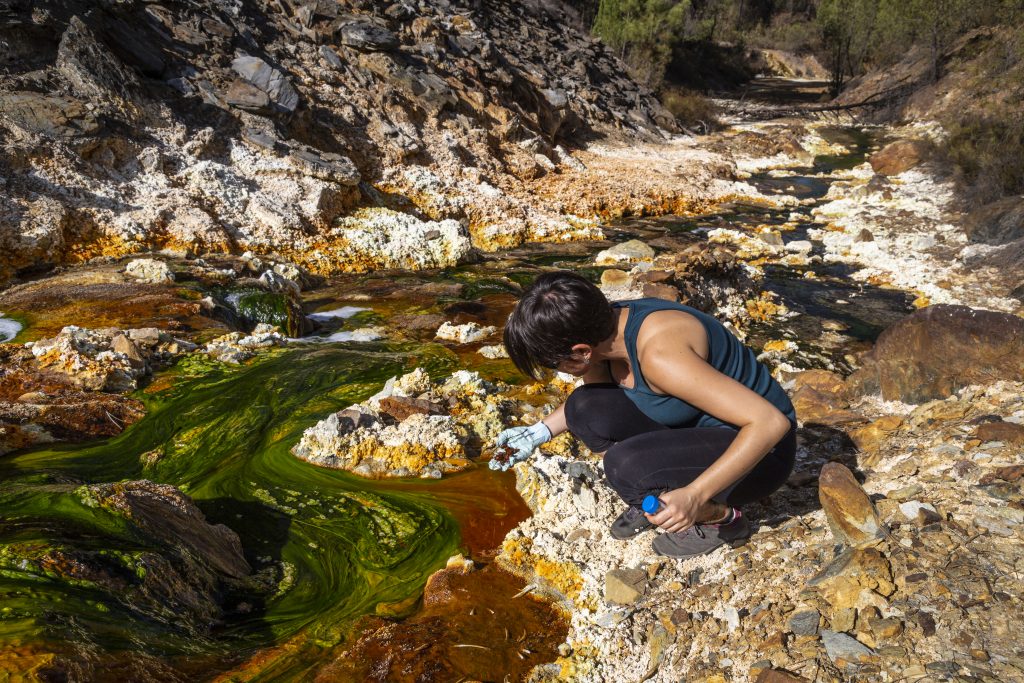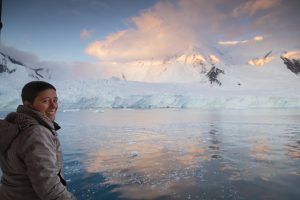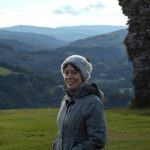What are you working on?
I am currently working full time in the NEMO project as member of the WP1. My research focuses on bioleaching of sulfidic mineral. This consists on using microorganisms, in this case acidophiles (acid-loving microorganisms), to extract metals from minerals taking advantage of their metabolic capabilities. My role, along with colleagues from WP1, is to study ways to improve metal recovery rates using laboratory-scale experiments, in this case columns, which simulate the operating conditions in bioheaps. To do so, I am studying the microbial activity and mineral transformations that occur during the bioleaching process. I am also collaborating in a project with colleagues from Spain and USA, studying the microbial ecology of acidic mine pit lakes.
 What attracts you in the research project you are working on?
What attracts you in the research project you are working on?
Have you ever been in the old mines in the South West of Spain (San Telmo mine, the river Odiel, the river Tinto)? Due to the lack of environmental concern, in the past, the mining industry has left enormous amounts of mine waste that is polluting and causing health issues worldwide. Thanks to a change in society, we are trying to be more environmental friendly; this is where NEMO comes into play and that is what makes this project attractive to me. I like the idea of making mining a greener industry reducing the amount of waste generated and, thus, reducing the impact that mining has on the environment. In addition, I like the challenge of studying the interaction of microorganisms and minerals. My work is also very multidisciplinary as I integrate microbiology, microbial ecology, genetics, mineralogy and mining. I like this variety a lot; one day I have to extract some DNA and others I have to study QEMSCAN® analyses.
Where do you work? What do you like about your organization or the city you live in?
I am working in the University of Exeter, in the Penryn Campus. But do not get confused, it is not in Exeter. Instead, it is two hours driving southwest near Land´s End. I am based in the Environmental and Sustainability Institute (ESI; University of Exeter, UK) where I spend most of my time in the laboratory. The ESI is an interdisciplinary center aiming to provide solutions to problems of environmental change. I am also a member of the Camborne School of mines (University of Exeter, Penryn Campus) a world-class institution for geosciences and mining. The University of Exeter is, for me, a perfect environment for a researcher as its policies promote personal and career development allowing scientists to pursue their careers in a nice integrative environment where everybody is listened to. Moreover, the campus is located in Cornwall, which is a beautiful place. Although it can be rainy and has no mountains, its coastline is breathtaking, and it is the best place to surf in the whole UK.
 Can you tell us about something that you really want or wanted to do?
Can you tell us about something that you really want or wanted to do?
Something that not many people know is that since I did my master I wanted to go to Antarctica. Well, I did it! I was really lucky to join a research cruise and spend a month navigating the cold waters of the Antarctic Peninsula. Surprisingly, I did not get seasick, I managed to set foot on land and touch the Southern Ocean waters, I even walked on an inhabited island where not many people has been. On a personal level and as a biologist, I feel so lucky to being able to see so much wildlife, penguins, humpback whales, killer whales (orcas), seals and more. As a scientist, I got some samples to study the microbial ecology of seafloor sediments in Antarctic fjords and met other outstanding scientists. In conclusion, the trip was amazing, I learnt a lot, enjoyed a lot, so I would like to encourage everybody to pursue their dreams.
 Biography of Carmen Falagán Rodríguez
Biography of Carmen Falagán Rodríguez
Carmen was born in Madrid, Spain. She studied Conservation Biology in the University of Alcalá de Henares (Madrid, Spain). Always attracted by the sea, she moved to Cádiz (Spain) to do a Master in Oceanography. She lived there for some years until she moved back to Madrid to do her PhD in the Geological Survey of Spain in collaboration with the University of the Basque Country (Leioa, Spain) to study the microbiological controls on the geohydrochemistry of acidic mine pit lakes in the Iberian Pyrite Belt. During her PhD she also spend some time in Bangor University (Wales, UK) as a visiting student in the Bangor Acidophile Research Team. After the completion of the PhD she went back to Bangor as a research fellow to work in bioleaching of tailings until 2018 when she moved to Cornwall to work for the NEMO project in the University of Exeter. Her research interests include microbial ecology of extreme environments, microbe-mineral interactions, microbial controls on biogeochemical cycles, bioremediation and studying the impact of mining in the environment at a macro- and microscale.


